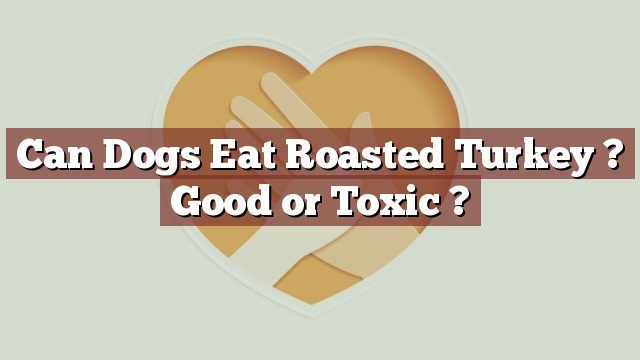Can Dogs Eat Roasted Turkey? Good or Toxic?
Roasted turkey is a delicious centerpiece of many festive meals, especially during Thanksgiving. As pet owners, it is crucial to be aware of what foods are safe for our furry friends to consume. Dogs have different nutritional needs and digestive systems than humans, and certain foods that are harmless to us can be potentially toxic to them. So, can dogs eat roasted turkey?
Nutritional Value of Roasted Turkey for Dogs
Roasted turkey is a good source of protein, which is an essential component of a dog’s diet. It contains essential amino acids that help build and repair tissues, support a healthy immune system, and promote overall growth and development. Additionally, turkey is rich in vitamins and minerals such as vitamin B6, niacin, phosphorus, and selenium, which are beneficial for a dog’s overall health.
Can Dogs Eat Roasted Turkey? Safety Considerations
Yes, dogs can eat roasted turkey, but it is essential to consider a few factors before sharing this delicious treat with your furry friend. Firstly, the turkey should be plain and unseasoned. Avoid using any spices, herbs, or seasonings, as they can upset your dog’s stomach or even be toxic to them. Additionally, make sure to remove the skin and any bones from the turkey before feeding it to your dog. The skin is high in fat and can lead to digestive issues or pancreatitis, while bones can pose a choking hazard or cause internal injuries.
It is also important to note that while plain roasted turkey is safe for dogs, other Thanksgiving dishes often served alongside it may not be. Foods such as onions, garlic, and gravy can be harmful or toxic to dogs. Always be cautious and ensure that your dog only consumes plain, unseasoned roasted turkey.
Potential Risks and Benefits of Feeding Roasted Turkey to Dogs
Feeding roasted turkey to your dog can have both risks and benefits. On the positive side, turkey is a lean and high-quality source of protein, which can support your dog’s muscle development and overall health. It also contains important vitamins and minerals that contribute to their well-being.
However, there are also potential risks associated with feeding roasted turkey to dogs. As mentioned earlier, the skin is high in fat and can lead to gastrointestinal upset or weight gain if consumed in large quantities. Additionally, if your dog consumes bones, it can cause choking, blockages, or puncture their digestive tract. These risks can be minimized by ensuring that the turkey is properly prepared, with the skin and bones removed.
What to Do If Your Dog Eats Roasted Turkey
If your dog accidentally consumes roasted turkey, it is important to observe their behavior and monitor for any signs of distress or abnormal symptoms. Keep an eye out for vomiting, diarrhea, abdominal pain, or difficulty breathing. If any of these symptoms occur, it is advisable to contact your veterinarian immediately. They will be able to provide you with guidance tailored to your dog’s specific situation.
Conclusion: Balancing Risk and Moderation in Feeding Roasted Turkey to Dogs
In conclusion, dogs can eat roasted turkey, but it is crucial to exercise caution and moderation. Plain and unseasoned roasted turkey can be a healthy and enjoyable treat for your dog, providing them with essential proteins and nutrients. However, it is crucial to remove the skin and bones, as they can pose potential risks to their health.
Always remember that each dog is unique, and their tolerance and reaction to certain foods may vary. If you have any concerns or questions about your dog’s diet, it is best to consult with your veterinarian. They can provide you with personalized advice and help you create a balanced and safe diet for your beloved four-legged companion.
Thank you for investing your time in exploring [page_title] on Can-Eat.org. Our goal is to provide readers like you with thorough and reliable information about various dietary topics. Each article, including [page_title], stems from diligent research and a passion for understanding the nuances of our food choices. We believe that knowledge is a vital step towards making informed and healthy decisions. However, while "[page_title]" sheds light on its specific topic, it's crucial to remember that everyone's body reacts differently to foods and dietary changes. What might be beneficial for one person could have different effects on another. Before you consider integrating suggestions or insights from "[page_title]" into your diet, it's always wise to consult with a nutritionist or healthcare professional. Their specialized knowledge ensures that you're making choices best suited to your individual health needs. As you navigate [page_title], be mindful of potential allergies, intolerances, or unique dietary requirements you may have. No singular article can capture the vast diversity of human health, and individualized guidance is invaluable. The content provided in [page_title] serves as a general guide. It is not, by any means, a substitute for personalized medical or nutritional advice. Your health should always be the top priority, and professional guidance is the best path forward. In your journey towards a balanced and nutritious lifestyle, we hope that [page_title] serves as a helpful stepping stone. Remember, informed decisions lead to healthier outcomes. Thank you for trusting Can-Eat.org. Continue exploring, learning, and prioritizing your health. Cheers to a well-informed and healthier future!

